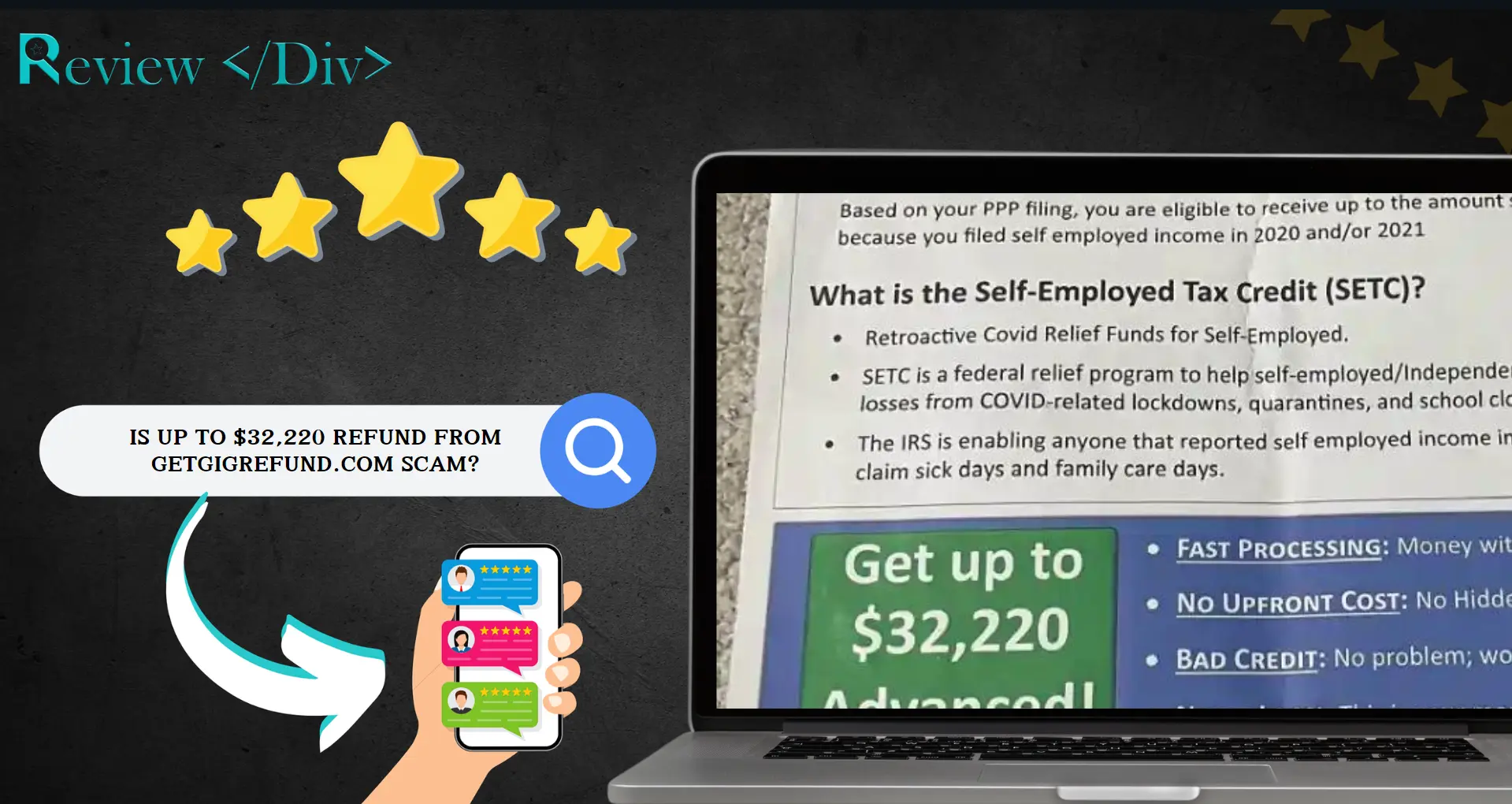Nowadays, some people in America have received messages that include COVID-19 relief refunds from GetGigRefund. But, it has recently been charged with targeting self-employed individuals with a potential scam.
In this post, We will explore the website’s doubtful practices, how the fraud works, and how people can protect themselves from such fraudulent activities.
GetGigRefund.com Scam Overview
GetGigRefund.com claims to offer COVID-19 relief funds to self-employed individuals who earned income in 2020 and 2021. The website promotes that these individuals can receive significant financial payouts through the Self-Employed Tax Credit (SETC), which helps them recover losses caused by COVID-related lockdowns and quarantines.
However, Several reports indicate that people have received unusual messages from GetGigRefund.com containing personal information, such as loan numbers and amounts received from the Paycheck Protection Program (PPP).
The presence of sensitive data has increased concerns that GetGigRefund.com is a scam that wants to collect personal and financial information from individuals.
Experts Review on GetGigRefund.com Scam
According to experts, GetGigRefund.com’s main issue lies in its promotion of a fake tax credit. The IRS has warned the public about the tricky claims around a so-called “Self-Employed Tax Credit,” which confirms that no such credit exists.
The IRS provides real tax credits for self-employed people, such as the Credits for Sick Leave and Family Leave, which were created to help during the COVID-19 pandemic.
However, these credits have specific eligibility requirements and are not as largely available or profitable as GetGigRefund.com makes them seem.

By advertising this false tax credit, GetGigRefund.com not only raises false hopes but also tricks people into sharing personal and financial information.
The website falsely claims that eligible applicants can receive up to $32,000 in refunds. This figure is completely fabricated and meant to mislead and attract victims into the scam.
How Does GetGigRefund.com Refund Scam Work?
GetGigRefund.com loss on self-employed individuals who may not fully understand their eligibility for COVID-19 relief funds. The scam involves sending emails or letters, that falsely claim the recipients qualify for large tax credits related to the pandemic.
The GetGigRefund.com scam targets victims through a series of tricky steps. First, scammers send unsolicited emails, calls, or letters claiming the recipient is eligible for a large tax refund. These messages use fake logos and official-sounding language to mimic genuine government tax agencies, creating a false sense of legitimacy.
If the recipient shows interest, they are directed to a website, where they are asked to provide personal information like Social Security numbers, tax IDs, and bank details to process the refund.
After collecting this information, the scammers falsely comfort victims that their refund claims are valid and promise significant payouts of up to $32,000. This is a tactic to gain trust and lower doubt, which makes people more willing to share their data.
However, once the scammers have the information they can achieve identity theft access bank accounts, open credit lines, or carry out other fraudulent activities.
How To Protect Yourself From These Scams?
To protect yourself from scams like GetGigRefund.com, you should follow these steps.
1. Verify Information: Check any tax-related claims directly with the IRS or talk to a reliable tax professional. Avoid trusting details from random emails, calls, or messages, especially when involving your finances.
2. Report Any Suspicious Activity: If you experience suspicious emails, calls, or offers, report them immediately to the IRS, the Federal Trade Commission (FTC), or other relevant authorities. Reporting quickly can help stop scammers and protect others.
3. Stay Updated: Keep yourself informed about the latest scams and warnings from the IRS and other agencies. Scammers change their tactics, so staying informed helps you spot new scams and stay safe.
Jason Thomas is a Computer Science student specializing in AI & ML, dedicated to safeguarding individuals from online threats. Passionate about exposing internet scams, Jason spends his free time identifying and reviewing various fraudulent activities and unethical materials. With a unique blend of theoretical knowledge and practical application, he is a valuable contributor to the fight against online fraud. His commitment to technology and programming fuels his mission to protect people from scams and enhance internet safety for everyone.







